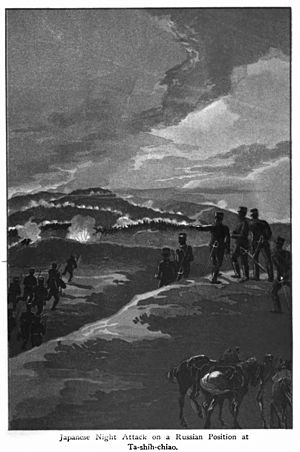Battle of Tashihchiao
| Battle of Tashihchiao | |||||||
|---|---|---|---|---|---|---|---|
| Part of the Russo-Japanese War | |||||||
 Japanese Night Attack at Tashihchiao |
|||||||
|
|||||||
| Belligerents | |||||||
|
|
|
||||||
| Commanders and leaders | |||||||
| General Oku Yasukata | Lieutenant General Georgii Stakelberg Lieutenant General Nikolai Zarubaev |
||||||
| Strength | |||||||
| 64,000 | 60,000 | ||||||
| Casualties and losses | |||||||
| 1,000 (estimated) | 1,000 (estimated) | ||||||
The Battle of Tashihchiao (大石橋の戦い Taisekihashi no Tatakai?) was a land engagement fought on 24–25 July 1904, during the Imperial Japanese Army's advance toward Liaoyang in first stage of the Russo-Japanese War. Tashihchiao (modern Dashiqiao) is located about 25 kilometres (16 mi) southwest of the city of Haicheng, in present-day Liaoning Province, China. The town of Tashihchiao was of strategic importance in the Russo-Japanese War, as it was a railroad junction between the main line on the South Manchurian Railway and a spur which led to the old treaty port of Yingkou (Newchwang). Control of both was essential for further advances by Japanese forces towards Liaoyang and Mukden.
On the Japanese side were the 3rd, 4th, 5th and 6th Divisions of the Japanese Second Army under General Oku Yasukata. The combined force had over 64,000 men, including 46,000 infantry, and 252 guns. After the victory at the Battle of Telissu, General Oku rested for four days for re-supply, which was delayed due to heavy rains, and to bring his 6th Division up to full strength. Although the Japanese were moving parallel to the railway line and the Russians had left behind over 300 freight cars at Dalny, the Japanese were unable to utilize the railway due to lack of locomotives. Locomotives procured by the Japanese matching the Russian railway gauge prior to the start of the war had been sunk by Russian commerce raiding in the Sea of Japan. The Japanese improvised by hauling the freight cars by teams of 16 men per car, and in addition hired 70 junks from the Chinese to move supplies up the coast to a point a couple of miles from the Japanese troop deployment.
...
Wikipedia
